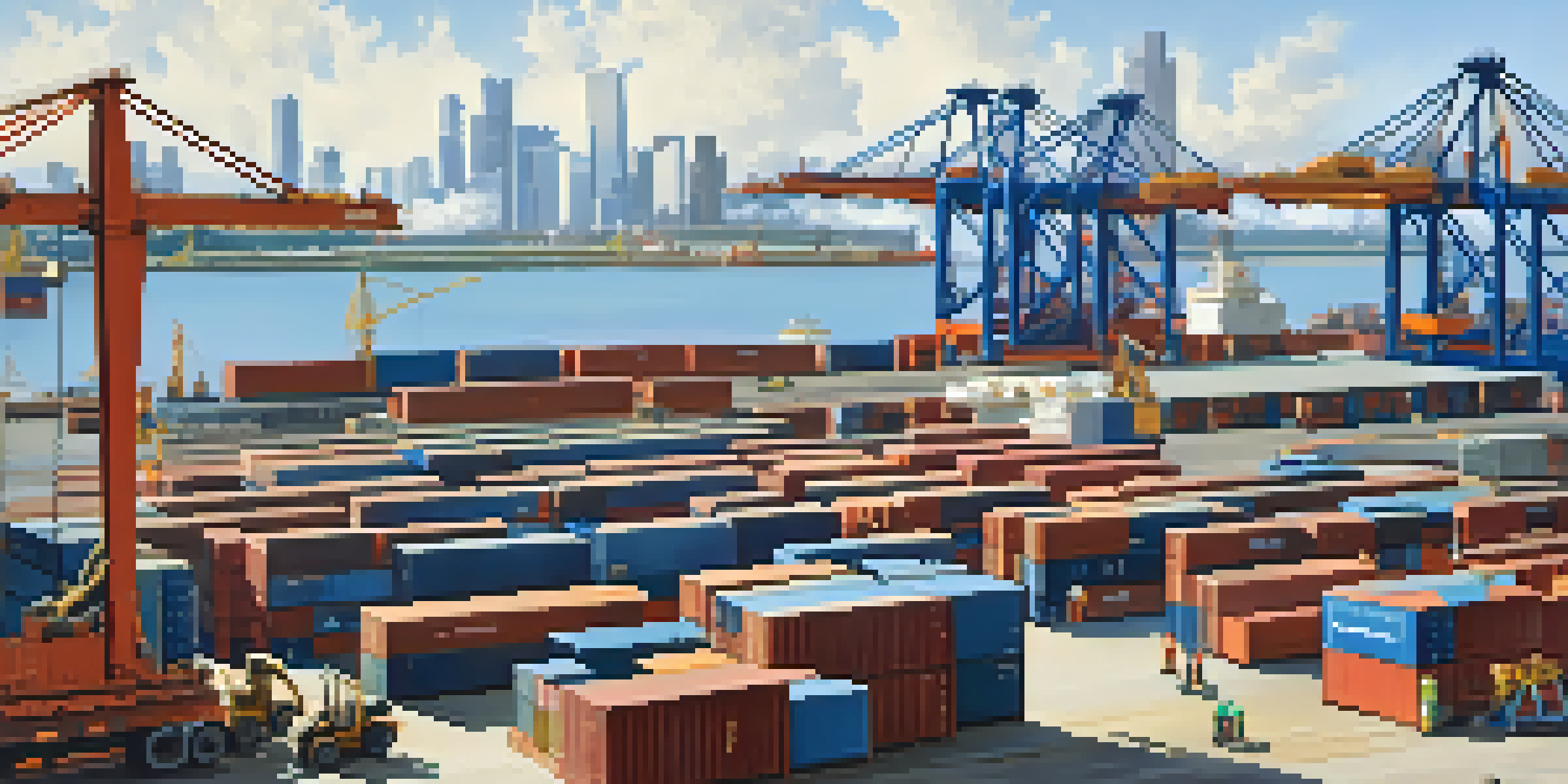Houston's Role as a Leading Global Trade Hub in the U.S.

Overview of Houston's Global Trade Significance
Houston stands as a beacon of global trade, strategically positioned in the southern United States. Its extensive transportation networks, including highways, railroads, and ports, make it accessible for international commerce. This vibrant city has established itself as a key player in import and export activities, contributing significantly to the U.S. economy.
Trade is a critical driver of economic growth and development. It creates jobs, raises incomes, and increases access to goods and services.
The Port of Houston, one of the busiest ports in the nation, serves as a critical gateway for goods entering and leaving the country. This facility handles millions of tons of cargo annually, ranging from petrochemicals to agricultural products. Consequently, Houston's port activities bolster not only local job markets but also strengthen national trade relationships.
Moreover, Houston's diverse economy, supported by industries such as energy, healthcare, and technology, enhances its trade capabilities. The city's robust infrastructure and business-friendly environment attract global companies, further solidifying its status as a leading trade hub.
Transportation Infrastructure: The Backbone of Trade
Houston’s transportation infrastructure is a marvel, combining air, land, and sea routes to create a seamless trade network. George Bush Intercontinental Airport serves as a major international hub, connecting Houston to cities around the globe. This accessibility is crucial for businesses that rely on rapid shipping and logistics to meet consumer demands.

Additionally, the extensive highway and rail systems facilitate efficient movement of goods throughout the region. Major highways like Interstate 10 and 45 converge in Houston, allowing for quick access to other U.S. markets and beyond. This interconnectedness not only streamlines trade operations but also reduces shipping costs for businesses.
Houston: A Global Trade Hub
Houston's strategic location and infrastructure make it a vital center for international commerce.
The integration of these transportation modes fosters a dynamic environment for trade, attracting companies looking to establish a foothold in the U.S. market. With such a strong infrastructure in place, Houston is well-equipped to support businesses in their global trade ventures.
Diverse Industries Fueling Houston's Trade Growth
Houston's economy is a melting pot of diverse industries, each contributing to its robust trade ecosystem. The energy sector, particularly oil and gas, plays a significant role in driving trade activities. As one of the largest energy hubs worldwide, Houston exports substantial quantities of petroleum and natural gas to international markets.
The future of trade is not only about goods, but also about services, ideas, and digital content - the global economy is evolving.
In addition to energy, Houston is also a leader in healthcare and biotechnology. The Texas Medical Center, the largest medical complex globally, attracts researchers and businesses eager to innovate. This influx of talent and investment enhances the city’s capabilities in exporting medical technologies and pharmaceuticals.
Moreover, the technology sector is on the rise, with numerous startups and established firms focusing on digital solutions for trade and logistics. This blend of industries not only supports local job creation but also positions Houston as a competitive player in global trade.
The Role of International Business Partnerships
International business partnerships are vital to Houston's trade landscape, fostering collaboration between local companies and global markets. The city is home to numerous trade organizations and chambers of commerce that facilitate these connections. Through networking events and trade missions, businesses can establish valuable relationships that enhance their export capabilities.
These partnerships often lead to joint ventures, allowing companies to share resources and expertise while entering new markets. For example, a Houston-based energy firm might collaborate with a foreign company to develop renewable energy projects. Such initiatives not only diversify trade opportunities but also promote innovation.
Diverse Industries Drive Growth
The city's economy thrives on a mix of sectors, including energy, healthcare, and technology, boosting its trade capabilities.
Furthermore, Houston's multicultural population is an asset in building these international relationships. Many residents bring cultural knowledge and language skills that help bridge the gap between local businesses and their foreign counterparts, strengthening Houston's role as a global trade hub.
Impact of Trade on Houston's Economy
Trade has a profound impact on Houston's economy, generating billions in revenue and supporting thousands of jobs. The city's position as a trade hub means that many sectors benefit from increased commerce, from logistics to manufacturing. This economic activity stimulates growth, attracting further investments and talent to the region.
As businesses expand their reach to international markets, they often require additional workforce, leading to job creation across various industries. This growth not only enhances the standard of living for many residents but also contributes to a vibrant and diverse local culture. The ripple effect of trade resonates throughout the community, creating a dynamic economic environment.
Moreover, the taxes generated from trade activities provide essential funding for public services and infrastructure improvements. This symbiotic relationship between trade and economic development ensures that Houston remains a competitive player in the global economy.
Challenges Facing Houston's Trade Landscape
Despite its strengths, Houston's trade landscape faces several challenges that could impact its growth. One significant issue is the vulnerability of the region to natural disasters, such as hurricanes and flooding. These events can disrupt operations at the Port of Houston and affect supply chains, causing delays and financial losses for businesses.
Additionally, global trade tensions and changing regulations can create uncertainty for local companies. Tariffs and trade agreements can influence the cost of imports and exports, impacting profitability. Businesses must stay agile and adaptable to navigate this evolving landscape, which can be daunting for many.
Challenges in Trade Landscape
Houston faces challenges such as natural disasters and workforce development that could impact its trade growth.
Lastly, workforce development is crucial for sustaining trade growth. As industries evolve, the demand for skilled labor increases. Ensuring that the local workforce is equipped with the necessary skills to meet these demands is essential for maintaining Houston's competitive edge in global trade.
Future Outlook: Houston's Trade Potential
Looking ahead, Houston's potential as a global trade hub is promising, supported by ongoing investments in infrastructure and technology. The city is actively pursuing initiatives to enhance its logistics capabilities, such as expanding the Port of Houston and improving transportation networks. These developments will further solidify Houston's position as a key player in international trade.
Moreover, the focus on sustainability and innovation presents new opportunities for growth. As businesses increasingly seek environmentally friendly solutions, Houston's energy sector can leverage its expertise in renewable technologies to meet global demands. This shift not only aligns with trade trends but also addresses pressing environmental concerns.

Lastly, fostering a culture of entrepreneurship and supporting startups will be crucial for driving future trade growth. By encouraging innovation and providing resources for emerging businesses, Houston can continue to thrive as a dynamic global trade hub in the years to come.